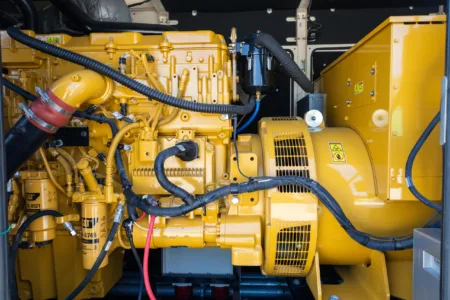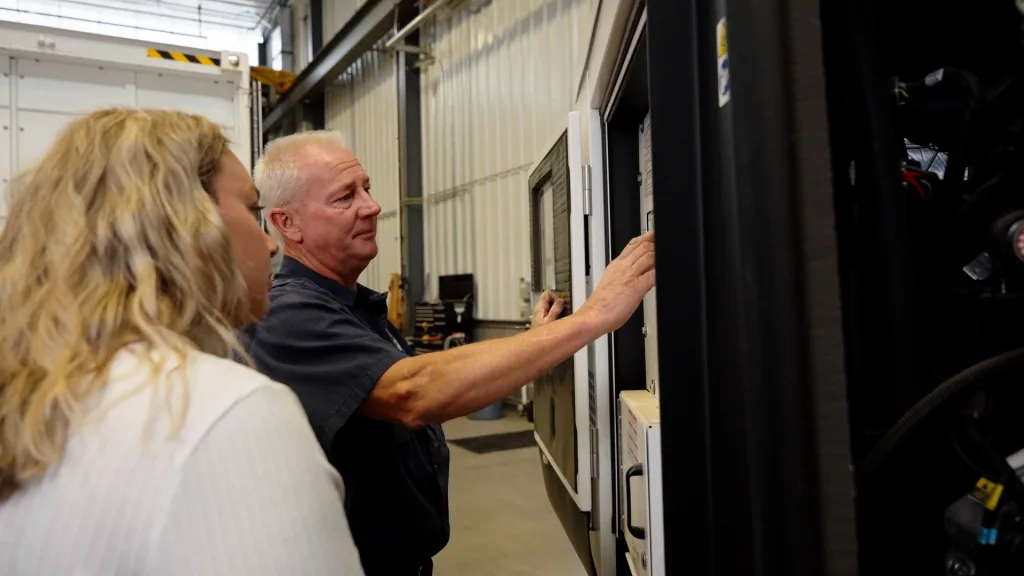In today’s fast-paced economy, the demand for reliable and efficient backup power for business is ever-increasing. Whether it’s for an industrial warehouse or a remote, off-grid location, the necessity for consistent electricity cannot be overstated. Diesel generators stand out as one of the most dependable solutions for generating electricity, particularly in scenarios where the main power supply is vulnerable, unavailable, or unreliable. Their robust design and efficiency make them a preferred choice across various industries and applications.
Understanding Diesel Generators
Diesel generators are machines that convert diesel fuel into electrical energy. They consist of a diesel engine and an electric generator (alternator) working together to produce electricity. This system is fundamental for providing power in areas where the grid may not reach or in situations where power stability is a concern. These generators are widely used across various applications due to their efficiency, durability, and cost-effectiveness, making them indispensable tools in both industrial and rural settings.

Key Components of Diesel Generators
- Diesel Engine: The heart of the generator, responsible for converting fuel into mechanical energy. Diesel engines are renowned for their reliability and ability to operate under challenging conditions. Their design allows for continuous operation over extended periods without significant degradation. Learn more here.
- Alternator: Converts mechanical energy from the engine into electrical energy. The alternator is crucial for transforming the diesel engine’s output into usable electricity, ensuring that power requirements are met efficiently. Learn more here.
- Fuel System: Stores and supplies diesel fuel to the engine. A well-designed fuel system ensures a steady flow of fuel, optimizing performance and preventing disruptions in power supply. Learn about bi-fuel and dual fuel systems.
- Cooling and Exhaust Systems: Manage the heat produced during operation and dispose of exhaust gases. Efficient cooling systems prevent overheating, which can lead to damage, while exhaust systems ensure the safe expulsion of gases, maintaining environmental compliance. Learn more here.
- Control Panel: Allows users to operate and monitor the generator. The control panel provides essential data and control options to manage the generator’s performance, offering features like remote monitoring and automated start/stop functions. Learn more here.
- Battery Charger: Keeps the generator’s battery charged and ready for use. This component is vital for ensuring the generator can start promptly, particularly in emergencies where power is needed immediately. Learn more here.
Interested in learn more about how generator work? Learn more here.
Advantages of Diesel Generators
Reliability and Durability
Diesel generators are known for their robust construction and long lifespan. The engines are designed to withstand high levels of wear and tear, making them ideal for continuous and heavy-duty use. This reliability is why many industries choose diesel backup generators as a primary or secondary power source. Their ability to perform under extreme conditions without frequent breakdowns is a testament to their engineering excellence.
The durability of diesel generators means fewer replacements and repairs over their operational life, translating into significant cost savings. Industries that require uninterrupted power, such as manufacturing and healthcare, rely heavily on the steadfast performance of diesel generators to maintain operations without costly interruptions.
Fuel Efficiency
Diesel engines are more fuel-efficient compared to gasoline engines, especially when operating at high loads. This efficiency translates into lower fuel costs over time, making diesel-powered generators a cost-effective option for long-term power needs. The high energy density of diesel fuel means that generators can run longer on the same amount of fuel compared to other types.
Advancements in diesel engine technology have further improved fuel efficiency, reducing operational costs even more. This makes diesel generators an attractive option for businesses and individuals looking to minimize their energy expenses while maximizing output.
Low Maintenance Requirements
One of the significant advantages of diesel generators is their relatively low maintenance requirements. The engines have fewer moving parts compared to other types of generators, which means less wear and tear and fewer parts that can fail. Regular maintenance involves routine checks and oil changes, ensuring the generator operates smoothly and efficiently.
The simplicity in design and the robust nature of diesel engines lead to fewer technical issues. This reliability in performance means that businesses can allocate fewer resources to maintenance, allowing them to focus on core operations while enjoying uninterrupted power supply.
Safety
Diesel fuel is less flammable than gasoline, reducing the risk of fire hazards. This inherent property makes diesel generators a safer choice for environments where fire risks must be minimized. Diesel generators are equipped with various safety features, such as automatic shutdown systems, to prevent accidents and ensure safe operation.
The robust construction of these generators means they can withstand harsh environmental conditions, maintaining safety and performance standards. This reliability in safety makes diesel generators a preferred choice in industries where safety is paramount, such as hospitals and data centers.
Versatility
Diesel generators come in various sizes and configurations, making them suitable for a wide range of applications. From small residential diesel generators to large diesel generators for industrial use, there’s a diesel generator to meet every need. They can be used as a primary power source, as well as a standby or emergency power source during outages.
The adaptability of diesel generators allows them to be customized for specific requirements, whether it’s for temporary use during construction projects or as a permanent power solution in remote areas. This versatility ensures that diesel generators can meet the diverse needs of different sectors, from agriculture to telecommunications.
Environmental Impact
While diesel engines are traditionally associated with higher emissions, modern diesel generators are equipped with advanced technology to minimize their environmental impact. Many are designed to meet strict emission standards, reducing the amount of pollutants released into the atmosphere. Diesel fuel is more energy-dense, meaning less fuel is required to produce the same amount of power compared to other fuels.
Innovations such as diesel particulate filters and selective catalytic reduction systems are helping to further reduce emissions, making modern diesel generators more environmentally friendly. As regulatory bodies continue to impose stricter environmental guidelines, the diesel generator industry is adapting to meet these challenges, ensuring that they remain a viable option for sustainable power generation.
Applications of Diesel Generators
Residential Use
For homeowners, a residential diesel generator can provide peace of mind during power outages. These generators ensure that essential appliances and systems, such as refrigerators, heating, and lighting, continue to operate until the main power supply is restored. This reliability is crucial for maintaining comfort and safety in the home, particularly in regions prone to severe weather or frequent power interruptions.
Residential diesel generators can add value to a property, as they are often seen as a desirable feature by potential buyers. Having a reliable backup power source can set a home apart in the real estate market, providing an attractive selling point.
Commercial and Industrial Use
In commercial and industrial settings, diesel gensets (generator sets) are essential for maintaining operations during power disruptions. They provide backup power for critical systems, such as data centers, hospitals, and manufacturing facilities, preventing costly downtime and ensuring business continuity. The ability to maintain operations without interruption is critical in these environments where even brief power outages can result in significant financial losses.
The scalability of diesel generators allows businesses to expand their power capacity as needed. This flexibility is particularly beneficial for growing businesses that require reliable power solutions to meet increasing demands.
Emergency and Standby Power
Diesel emergency generators are commonly used in emergency situations to provide immediate power when the main supply fails. They are crucial for maintaining safety and security in various environments, from hospitals to military operations. In emergency situations, the quick response time of diesel generators can be lifesaving, ensuring that critical systems remain operational.
The reliability of diesel generators in emergencies is supported by their ability to start quickly and run continuously for extended periods. This makes them an indispensable asset for emergency preparedness in various sectors, ensuring readiness and resilience in the face of unexpected power disruptions.
Remote and Off-Grid Locations
In remote areas where access to the main power grid is limited or non-existent, diesel generators serve as a reliable source of electricity. They are often used in conjunction with renewable energy sources, such as solar panels, to create a hybrid power system that maximizes efficiency and reduces reliance on fossil fuels. This combination allows for sustainable power solutions that can meet the energy needs of remote communities or operations.
Diesel generators can be tailored to meet the specific power requirements of off-grid locations, offering a practical solution where traditional power infrastructures are not feasible. This capability is crucial for industries such as mining and oil exploration, where operations are often situated in isolated locations.
Choosing the Right Diesel Generator

When selecting a diesel generator, consider the following factors:
- Power Output: Determine your power requirements to ensure the generator can handle your electrical load. Accurate assessment of power needs is essential for selecting a generator that can deliver optimal performance without overloading.
- Size and Portability: Choose a generator that fits your space and portability needs, especially if it will be moved frequently. Considerations such as weight, dimensions, and ease of transport can significantly impact the usability of the generator.
- Fuel Capacity: Consider the size of the fuel tank and how long the generator can run on a full tank. Larger tanks allow for extended operation without the need for frequent refueling, which is advantageous in remote or emergency situations.
- Noise Level: Some generators are designed to operate more quietly than others, which may be important for residential or noise-sensitive environments. Low-noise models can be particularly beneficial in urban settings where noise pollution is a concern.
- Budget: Diesel generators vary in price, so consider your budget and the total cost of ownership, including fuel and maintenance costs. Evaluating long-term expenses in addition to the initial purchase price will help ensure you choose a generator that offers the best value for your investment.
Diesel generators offer numerous advantages, making them a preferred choice for reliable and efficient power generation. Their durability, fuel efficiency, and versatility make them suitable for a wide range of applications, from residential backup power to large-scale industrial operations. Understanding the benefits and applications of diesel generators can help make an informed decision when considering them for your power needs. Whether you’re looking for a diesel backup generator for your home or a diesel genset for sale for your business, the reliability and efficiency of diesel generators make them an excellent investment.
Diesel generators remain an integral part of our energy infrastructure, providing essential power solutions that adapt to the diverse needs of modern society. As technology continues to advance, diesel generators are poised to become even more efficient and environmentally friendly, ensuring their continued relevance and value in the years to come.
Contact Generator Source today
If you or your business are looking for more information about industrial backup generators, Generator Source is here to help. With over 50 years in the industrial and commercial power generation industry, Generator Source has the knowledge and resources to support both end users and decision makers with buying, selling, servicing, or renting a diesel generator. Contact the Generator Source team today to learn more.